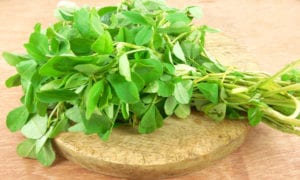Written by Greg Arnold, DC, CSCS. Six months of supplementation with fenugreek saw a significant decrease in symptom progression in the papprticipating Parkinson group compared to a 15.4% increase in symptoms in the placebo group of Parkinson’s who did not supplement with Fenugreek.
 Parkinson’s disease is one of the most common nervous system disorders in the elderly. It is characterized by a breakdown of the area of the brain that produces the nerve chemical dopamine, which helps control movement 1. The latest statistics regarding the cost of Parkinson’s disease is $25 billion per year, which breaks down to $25,000 per patient per year 2.
Parkinson’s disease is one of the most common nervous system disorders in the elderly. It is characterized by a breakdown of the area of the brain that produces the nerve chemical dopamine, which helps control movement 1. The latest statistics regarding the cost of Parkinson’s disease is $25 billion per year, which breaks down to $25,000 per patient per year 2.
The most popular treatment approach for Parkinson’s patients is the use of the prescription medication L-Dopa. It is the direct precursor of dopamine 3 and helps Parkinson’s patients regain voluntary movement and lessen involuntary movement 4. Unfortunately, the longer a patient is on L-Dopa, the less effective the medication becomes 5, usually after 5-6 years of treatment 6.
Fortunately, a 2014 study 7 suggests that the spice fenugreek may help L-Dopa manage Parkinson’s symptoms. The study involved 42 patients (20 men, 22 women) aged 55 to 67 with Parkinson’s disease. They were given either 600 milligrams of Fenugreek (300 mg twice daily) or a placebo in addition to their L-Dopa dosage for 6 months. Before and after the study, disability from Parkinson’s disease was measured with the Unified Parkinson’s Disease Rating Scale 8 while disease progression was measured with the Hoehn and Yahr staging tool 9.
After 6 months, those in the fenugreek group had a 0.99% increase in their disability (43.09 to 43.52) compared to a 15.4% increase in the placebo group (37.53 to 43.32, p < 0.05). In addition, for the Hoehn and Yahr testing, 5 of the 23 subjects (21.7%) in the fenugreek group had an improvement of their Parkinson’s symptoms (called “stage reversal”) compared to 1 of 19 (5.2%) in the placebo group. Both groups had 15 subjects with no stage change and 3 with stage worsening (p < 0.05).
When suggesting how fenugreek benefits those with Parkinson’s, the researchers pointed to fenugreek’s strong antioxidant 10,11 and anti-inflammatory 12,13 properties. They went on to conclude that fenugreek “showed the potential as an adjuvant to L-Dopa therapy and showed efficacy with respect to Parkinson’s Disease progression with excellent safety profile” but that “Fenugreek should be evaluated in larger population to fully validate the role in the management of Parkinson Disease.”
Source: Nathan, J., Siddika Panjwani, V. Mohan, Veena Joshi, and Prasad Arvind Thakurdesai. “Efficacy and Safety of Standardized Extract of Trigonella foenum‐graecum L Seeds as an Adjuvant to L‐Dopa in the Management of Patients with Parkinson’s Disease.” Phytotherapy Research 28, no. 2 (2014): 172-178.
Copyright © 2013 John Wiley & Sons, Ltd.
Posted August 5, 2016.
Greg Arnold is a Chiropractic Physician practicing in Hauppauge, NY. You can contact Dr. Arnold directly by emailing him at PitchingDoc@msn.com or visiting his web site at www.PitchingDoc.com
References:
- Medicine UNLo. Parkinson’s Disease. https://medlineplus.gov/parkinsonsdisease.html.
- Information NCfB. Direct and Indirect Cost of Parkinson Disease.
- Silva MA, Mattern C, Hacker R, Tomaz C, Huston JP, Schwarting RK. Increased neostriatal dopamine activity after intraperitoneal or intranasal administration of L-DOPA: on the role of benserazide pretreatment. Synapse (New York, NY). 1997;27(4):294-302.
- Cotzias GC, Papavasiliou PS, Gellene R. Modification of Parkinsonism–chronic treatment with L-dopa. The New England journal of medicine. 1969;280(7):337-345.
- Ruberg M, Scherman D, Javoy-Agid F, Agid Y. Dopamine denervation, age of onset, and Parkinson’s disease. Neurology. 1995;45(2):392.
- Papapetropoulos S, Basel M, Mash DC. Dopaminergic innervation of the human striatum in Parkinson’s disease. Movement disorders : official journal of the Movement Disorder Society. 2007;22(2):286-288.
- Nathan J, Panjwani S, Mohan V, Joshi V, Thakurdesai PA. Efficacy and safety of standardized extract of Trigonella foenum-graecum L seeds as an adjuvant to L-Dopa in the management of patients with Parkinson’s disease. Phytother Res. 2014;28(2):172-178.
- Rascol O, Goetz C, Koller W, Poewe W, Sampaio C. Treatment interventions for Parkinson’s disease: an evidence based assessment. Lancet. 2002;359(9317):1589-1598.
- Hoehn MM, Yahr MD. Parkinsonism: onset, progression and mortality. Neurology. 1967;17(5):427-442.
- Devasena T, Venugopal Menon P. Fenugreek seeds modulate 1,2-dimethylhydrazine-induced hepatic oxidative stress during colon carcinogenesis. The Italian journal of biochemistry. 2007;56(1):28-34.
- Kaviarasan S, Ramamurty N, Gunasekaran P, Varalakshmi E, Anuradha CV. Fenugreek (Trigonella foenum graecum) seed extract prevents ethanol-induced toxicity and apoptosis in Chang liver cells. Alcohol and alcoholism (Oxford, Oxfordshire). 2006;41(3):267-273.
- Ahmadiani A, Javan M, Semnanian S, Barat E, Kamalinejad M. Anti-inflammatory and antipyretic effects of Trigonella foenum-graecum leaves extract in the rat. J Ethnopharmacol. 2001;75(2-3):283-286.
- Vyas S, Agrawal RP, Solanki P, Trivedi P. Analgesic and anti-inflammatory activities of Trigonella foenum-graecum (seed) extract. Acta Pol Pharm. 2008;65(4):473-476.
